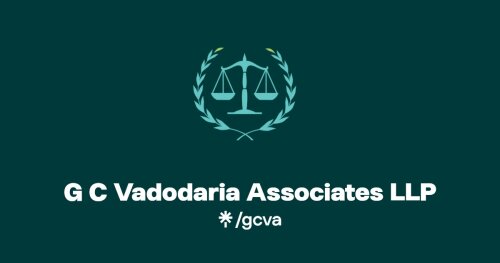Best Financial Services Regulation Lawyers in Ahmedabad
Share your needs with us, get contacted by law firms.
Free. Takes 2 min.
List of the best lawyers in Ahmedabad, India
About Financial Services Regulation Law in Ahmedabad, India
Financial Services Regulation Law in Ahmedabad, India, is part of a broader legal framework that governs the financial services sector across the country. It is designed to oversee the operations of banks, non-banking financial companies (NBFCs), insurance companies, investment firms, and other financial institutions. The primary objectives are to ensure stability, transparency, and integrity in the financial system, safeguard consumer interests, and avert financial crimes. Given the city's role as a growing financial hub, Ahmedabad is home to numerous financial entities that must comply with these regulations under the oversight of national regulatory bodies like the Reserve Bank of India (RBI), the Securities and Exchange Board of India (SEBI), and the Insurance Regulatory and Development Authority of India (IRDAI).
Why You May Need a Lawyer
Engaging a lawyer specializing in Financial Services Regulation may be necessary for various reasons. Individuals and businesses often require legal assistance to understand complex regulatory requirements, ensure compliance, draft and review contracts, and navigate through licensing processes. Additionally, legal experts can be invaluable in dispute resolution, such as addressing allegations of non-compliance, handling financial fraud cases, or participating in litigation with regulatory authorities. Legal advice can also be pivotal during corporate restructuring, mergers, acquisitions, and when interpreting and implementing new financial policies and laws.
Local Laws Overview
Financial services in Ahmedabad operate under a robust regulatory framework consistent with national laws but often subject to regional interpretations and administrative nuances. The primary framework includes adherence to central regulations, such as the Banking Regulation Act, SEBI Act, and IRDAI Act, coupled with local government stipulations. Key aspects involve ensuring anti-money laundering measures are in place, protecting consumer rights, maintaining transparency in financial dealings, and fulfilling obligations related to environmental, social, and governance (ESG) criteria.
Frequently Asked Questions
What is Financial Services Regulation?
Financial Services Regulation comprises rules and laws enforced to maintain the integrity, stability, and competitiveness of the financial system by ensuring that financial services operate in a fair and transparent manner.
Are there specific regulatory bodies for financial services in India?
Yes, key regulatory bodies include the Reserve Bank of India (RBI), the Securities and Exchange Board of India (SEBI), and the Insurance Regulatory and Development Authority of India (IRDAI), each responsible for overseeing different financial sectors.
How does compliance with financial regulations impact businesses?
Compliance ensures that businesses operate within the law, reducing the risk of legal penalties, enhancing reputation, and fostering trust among consumers and stakeholders.
What are the consequences of non-compliance with financial regulations?
Non-compliance can result in fines, legal action, damage to reputation, and in severe cases, revocation of licenses to operate within the financial sector.
Can financial institutions in Ahmedabad operate without a license?
No, financial institutions must obtain the necessary licenses from regulatory bodies before commencing operations to ensure that they meet regulatory standards.
What should consumers look for in financial services firms regarding regulatory compliance?
Consumers should ensure that the firm is registered with relevant agencies, has a good compliance track record, and is transparent about its policies and fees.
How can a lawyer help in understanding financial regulatory changes?
A lawyer can provide expert analysis on new laws and regulations, help businesses adjust their practices to comply with changes, and offer strategic advice on potential impacts.
Are there local financial regulations unique to Ahmedabad?
While the primary regulations are national, Ahmedabad may have specific guidelines or requirements based on regional administrative directives and business practices.
What recent changes are there in financial regulations in India?
There are ongoing updates to enhance financial inclusion, data protection, and digital finance regulations, often driven by technological advancements and global economic trends.
How often should businesses review their compliance with financial regulations?
Regular reviews are crucial and should be conducted at least annually or whenever there is a significant update in relevant regulations or business operations.
Additional Resources
For further assistance, individuals can connect with bodies such as the Reserve Bank of India, Securities and Exchange Board of India, Insurance Regulatory and Development Authority of India, and local bar associations. These entities provide guidelines, updates, and support concerning financial services regulations. Professional organizations and seminars in Ahmedabad can also offer invaluable insights and networking opportunities for legal advice and compliance.
Next Steps
If you require legal assistance in the field of Financial Services Regulation in Ahmedabad, begin by identifying a lawyer or a legal firm with a specialization in financial law. Schedule a consultation to discuss your specific needs, be it compliance, litigation, or advisory services. Prepare a list of questions or concerns beforehand to ensure a productive meeting. Additionally, keep abreast of regulatory updates and regularly consult with legal counsel to maintain ongoing compliance with financial laws.
Lawzana helps you find the best lawyers and law firms in Ahmedabad through a curated and pre-screened list of qualified legal professionals. Our platform offers rankings and detailed profiles of attorneys and law firms, allowing you to compare based on practice areas, including Financial Services Regulation, experience, and client feedback.
Each profile includes a description of the firm's areas of practice, client reviews, team members and partners, year of establishment, spoken languages, office locations, contact information, social media presence, and any published articles or resources. Most firms on our platform speak English and are experienced in both local and international legal matters.
Get a quote from top-rated law firms in Ahmedabad, India — quickly, securely, and without unnecessary hassle.
Disclaimer:
The information provided on this page is for general informational purposes only and does not constitute legal advice. While we strive to ensure the accuracy and relevance of the content, legal information may change over time, and interpretations of the law can vary. You should always consult with a qualified legal professional for advice specific to your situation.
We disclaim all liability for actions taken or not taken based on the content of this page. If you believe any information is incorrect or outdated, please contact us, and we will review and update it where appropriate.

















